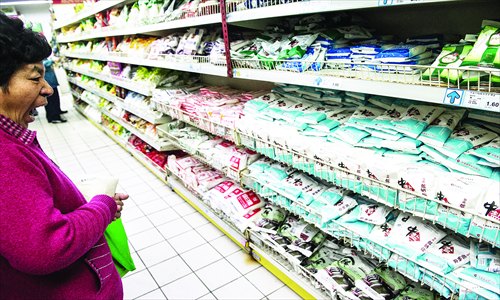
A tired shopper looks at packs of iodized salt at a Wu-Mart Store in Dongsi, Dongcheng district, Wednesday. Health authorities have denied it is a cause of cancer. Photo: Li Hao/GT
There is no link between consuming iodized salt and thyroid cancer, Chinese health authorities have announced.
Ma Yanming, media officer of Beijing Municipal Health Bureau told the Global Times Wednesday that so far, health experts have found no evidence to show iodized salt has any causal connection with thyroid cancer.
This comes amid alarming statistics released by the bureau last week which reported that rates of thyroid cancer have increased to become the fastest growing type of cancer in Beijing. With an average growth of 4.2 percent, its incidence has increased 225.2 percent over the past 10 years, the bureau said.
On Tuesday, the Ministry of Health released a report, which declared that there is no link between iodized salt and thyroid cancer.
The report aims to quash rumors of a link which have been circulating in China since 2010. These apparently started after 2,000 staff of a hospital in Hangzhou, Zhejiang Province, stopped using iodized salt in its employee cafeteria after discovering 12 people had been diagnosed with thyroid cancer.
In September, He Bing, deputy dean of the China University of Political Science and Law, posted an allegation on his Sina microblog that five staff who worked in the same hospital as a friend of his had thyroid cancer, which is "mostly caused by iodized salt."
But Ma guaranteed that the daily iodine intake quantity of Beijingers is at a safe level.
"Public health departments have been observing this figure for a long time, and the current level is neither too high, nor too low," said Ma.
Tong Chunrong, a hematology specialist at Ludaopei Hematology Oncology Center in Hebei Province, said that she suspects iodine is the cause of her colleagues' thyroid cancer.
"In the last two years, three of my colleagues were found to have thyroid cancer," said Tong.
"This is really rare, as the incidence of this cancer is only one in 100,000 people," she noted.
The fear of iodized salt comes from the fact that the thyroid has a close relation with iodine, said Tong, who added that she now buys iodine-free salt.
"A lack of iodine leads to goiter [enlarge thyroid] and many other negative results, so the link between iodine and bad health has become common sense to most Chinese. There is no evidence showing it is not the cause of thyroid cancer," she said.
Ma, however, said there are many reasons for developing cancer, including environmental.
"There are plenty of causes of cancer, including environmental, radiation or genetic, yet people haven't found any evidence showing ingesting too much iodine from salt is among these reasons," said Ma.
Gu Zhongyi, a clinical nutritionist at Beijing Friendship Hospital, supported Ma's assertions. Stopping the intake of iodized salt will not prevent thyroid cancer, but it may lead to other serious health conditions.
"A lack of iodine will not only result in goiter, but it can lead to deafness and being mute. In infants it may even lead to brain damage," said Gu.
"However, taking too much iodine from salt barely happens in China: The recommended maximum daily intake dose of iodine is 1,100 micrograms in the US and 300 according to the World Health Organization. The content of iodine in salt is 30 milligrams per kilogram in China, and an average Chinese person eats less than 10 grams of salt every day, that is to say, no more than 300 micrograms of iodine. This is safe according to both standards," he said.
Compared with the possible negative results of iodine shortage, humans have a much better tolerance of too much, so giving up iodized salt is unwise, Gu noted.
Beijing has already lowered the level of iodine in salt, said Ma, adding that non-iodized salt is also available.
"China's standard on iodine is no longer that strict now," said Ma, "people are free to buy non-iodized salt, and can choose how much iodine they have in their diet."
The Beijing Centers for Diseases Control and Prevention, which is the institute monitoring the daily intake of iodine from salt, had not responded to the Global Times by press time.

Copyright ©1999-2011 Chinanews.com. All rights reserved.
Reproduction in whole or in part without permission is prohibited.